Daily Telegraph editorial: Djokovic debacle exposes the fault lines of federation
The Djokovic visa case has highlighted the government’s biggest weakness during the pandemic — reactive decision-making after failing to anticipate problems, writes The Daily Telegraph.
Opinion
Don't miss out on the headlines from Opinion. Followed categories will be added to My News.
The most troubling thing about the Novak Djokovic debacle isn’t the decision being made — whatever decision that may yet be — but the way in which it has been made.
The confusion and internal contradiction between the three main parties — the federal government, Victorian government and Tennis Australia, not to mention Djokovic himself — has exposed the fault lines of federation that have become increasingly clear during the pandemic response.
The humiliating thing for Australia is that this time it has exposed us before the whole world.
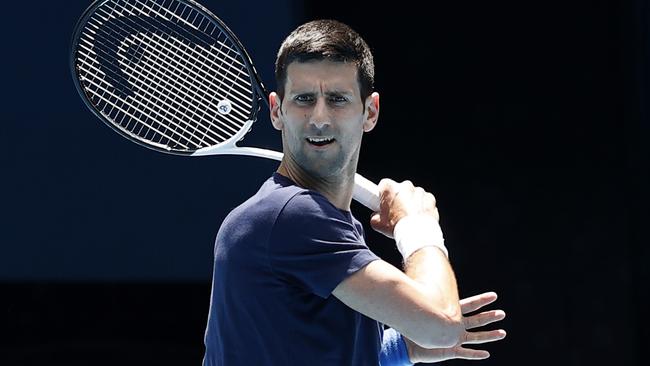
It now appears that Djokovic’s position is untenable — if only on the strength of his own admissions and documented movements prior to arrival in Australia — but whatever decision the government takes will result in yet more embarrassment.
If Djokovic is allowed to stay and compete in the Australian Open, it will be a complete reversal of the government’s tough talk on border restrictions and its “one rule for all” mantra.
But even if he is deported, as is widely expected, the question remains how the government was able to so thoroughly botch the process in the first place.
A great deal of blame must obviously land at the feet of the Victorian government and Tennis Australia, who both appeared to suffer from wishful thinking and thus offered Djokovic false hope.
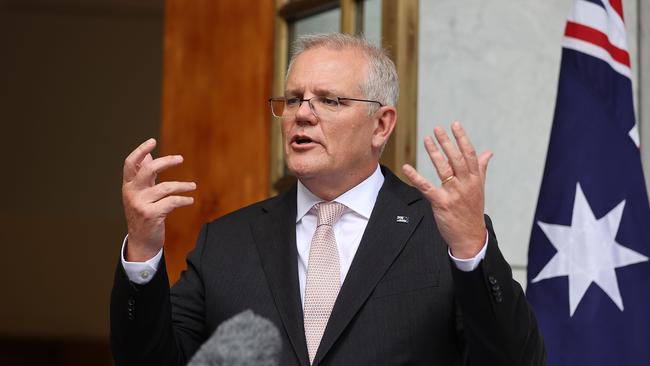
Yet the proverbial Blind Freddy could see that the unvaccinated Djokovic was headed for Australia and he would very quickly become the federal government’s problem. Despite this, there appeared to be no advance plan of how to deal with this inevitable confrontation.
Moreover, even after Djokovic’s arrival government officials managed to stuff up the procedure by which he was detained ahead of deportation, enabling the Federal Court to quash the decision and further humiliate the government.
In other words, whatever position the government arrives at it will only get there via the worst possible route. While the government deserves much praise in its handling of the pandemic, it is its failure to anticipate problems and this kind of reactive decision-making that has been its biggest weakness.
The Djokovic case, as ridiculous as it may be, only highlights this.
This country needs more national strategy, not more political tactics.
WE MUST LET OUR TRUCKERS ROLL
You have probably seen these stickers attached to the rear of 18-wheelers and other long-range haulers: “Truckies Carry This Country”, “Without Trucks Australia Stops”, and so on.
It now emerges that those declarations are entirely true.
During crisis talks held on Wednesday between Prime Minister Scott Morrison and various peak bodies, it was revealed that 20 to 50 per cent of trucking and logistics workers are in isolation or have Covid-19.
Their absence from work goes a long way to explaining why the shelves in so many of our supermarkets and stores are empty. Australia is without trucks, or at least without a massive number of them. And Australia has stopped.
To get things moving again, transport and logistics workers are now the PM’s top priority for isolation exemptions.
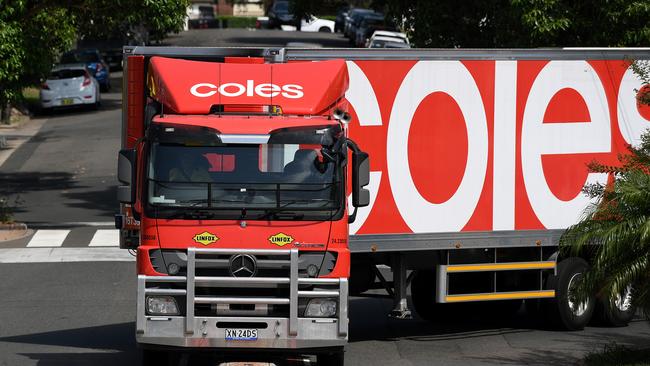
We need to, Morrison said, get “as many people as safely back at work in the critical sectors that keep Australia moving as possible”. In other words, let them truckers roll.
“The challenge of Covid with escalating cases is keeping this moving. That’s what riding this wave of Covid means,” the Prime Minister said. ”With so many cases appearing every day and that are expected to continue until the peak, this will have an obvious impact right across our supply chains.”
One obvious change that would accelerate supply chain recovery would not just to reduce close-contact isolation for transport workers but also to remove border requirements for rapid antigen tests.
To achieve that, the federal Government will need the help of states and territories.
Considering just how quickly certain products have vanished from our shelves, that co-operation should be immediate.
Just as Australians gained renewed appreciate for supermarket checkout staff and other frontline retail workers during the pandemic, we should also renew our respect for the transport sector.
Australians are now very much aware of how vital is that sector.
Committed and enthusiastic men and women toil every day on our roads and freeways to make our lives easier.
We’ll know they’re back on the job when our shelves are again replete.
Sometimes, a bumper sticker simply cannot be disputed.
SENSE AND CALM WILL GET US THROUGH COVID
There is much to be said for retaining a calm, consistent approach with each emerging Covid development.
For some, it is all too easy to greet every new Covid variant and every change in outcomes as a potential catastrophe.
The problem with this is that we would never move ahead at all. Instead, NSW would remain in eternal panic, too scared to make any progress.
Sensibly, Premier Dominic Perrottet rejects always-exaggerated disaster scenarios, preferring that common sense solutions be applied as required.
“We are in a transition period, and that creates inconveniences, challenges, and requires patience and an effort once again,” the Premier told The Daily Telegraph.
Significantly, he added: “We’ve got to live in the world as it is, not as we want it to be.”
That means living in a world that does not have endless taxation reserves to prop up a closed economy. The real world involves real jobs and real work.
We are presently seeing what happens when too many of those real jobs are compromised by Covid and associated staff shortages and declines in economic activity.
Alarmists might be inclined, given these circumstances and continued high daily case numbers, to hit the lockdown switch.
Perrottet is not of similar inclination, correctly observing that a return to lockdowns would needlessly harm businesses and workers.
It is a matter of causing the least harm. “We know many businesses right now are closed, but if we took the other approach, every business would be closed,” Perrottet said.
There is also the important issue of how NSW rebounds from its current situation. As the Premier is aware, doing so is much easier relative to how much economic activity is maintained.
“If you’ve had as much of society (as possible) functioning in the dark times, the light times come a lot faster,” he said.
To that end, a Dine and Discover-style voucher system is being considered by the state government to fund and disperse rapid antigen tests through schools and elsewhere.
This RAT and Recovery plan appears to have practical merit while remaining within reasonable financial constraints.
It would fit the calm and consistent approach favoured by this government.
DJOKER’S OPEN AND SHUT CASE
The first day of the Australian Open is still one week away, but fans have already enjoyed a titanic contest involving world No. 1 Novak Djokovic.
As he so often is on court, Djokovic is now a winner in court. And in straight sets, too.
Matters yesterday seemed to be going Djokovic’s way from the outset, as the Federal Court’s Judge Anthony Kelly reviewed documentation provided to the court by the Serbian champion’s legal team.
“Here, a professor and an eminently qualified physician have produced and provided to the applicant a medical exemption,” Judge Kelly said.
“That medical exemption and the basis on which it was given was separately given by a further independent expert specialist panel established by the Victorian state government and that document was in the hands of the delegate.
“The point I am agitated about is what more could this man have done?”
That poignant line – “what more could this man have done?” – will resonate with many Australians who have wrestled with bureaucratic rulings during the past two pandemic-afflicted years.
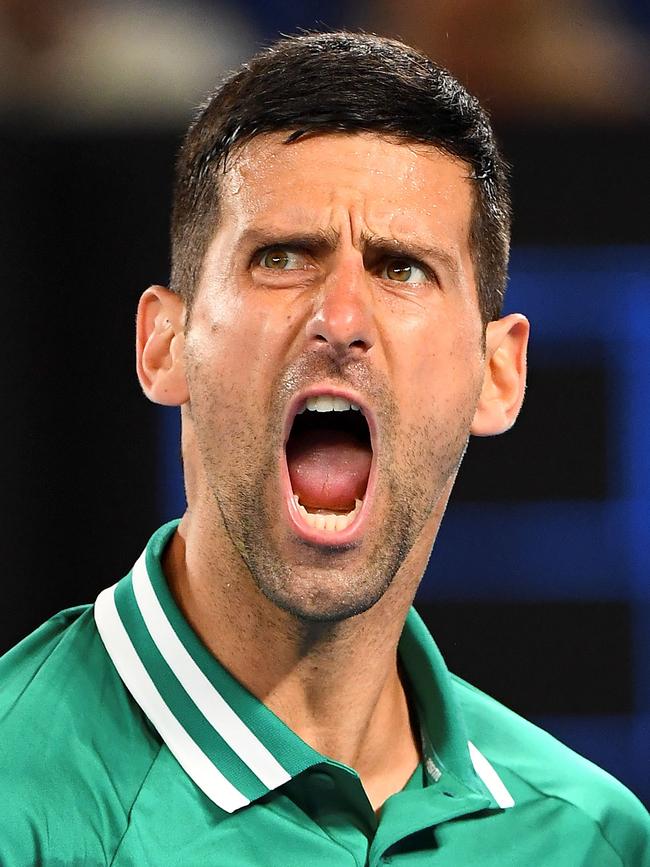
In Djokovic’s circumstance, an outcome was delivered rather more rapidly than is often the case with issues involving Covid compliance.
Following one recess, significant problems with the court’s live streaming service and the court-ordered liberation of Djokovic from his detention hotel, Judge Kelly was ready by 5pm to deliver a ruling.
It all went Djokovic’s way. Judge Kelly ordered the government to pay Djokovic’s costs, release him from detention within 30 minutes and return his passport and personal effects.
Game, set, match. Or so it briefly appeared. The government indicated that one last strategy may be in play.
Government lawyer Christopher Tran told the court that federal Immigration and Migrant Services Minister Alex Hawke would consider whether to use his “personal power” to again cancel Djokovic’s visa.
In response, Judge Kelly asked: “If this man is to be summarily removed, he cannot return to this country for three years. Am I right about that?”
Assured that he was, the judge concluded a dramatic day with an appropriately dramatic comment: “The stakes have now risen, rather than receded.”
DJOKER GOES FROM COURT TO COURT
Novak Djokovic has spent a lot of time on courts, but very little time in them. That won’t change today.
Djokovic will remain in a Melbourne detention hotel as his lawyers argue against federal government representatives that the Serbian tennis ace should be allowed to play in the Australian Open.
Yet Djokovic’s presence should still be sensed by everyone attending today’s scheduled hearing, not least because the legal battle under way so closely resembles a winner-take-all Grand Slam final.
Before this “match” began, most onlookers – like a Grand Slam, that means a global audience – would have backed the government as favourites.
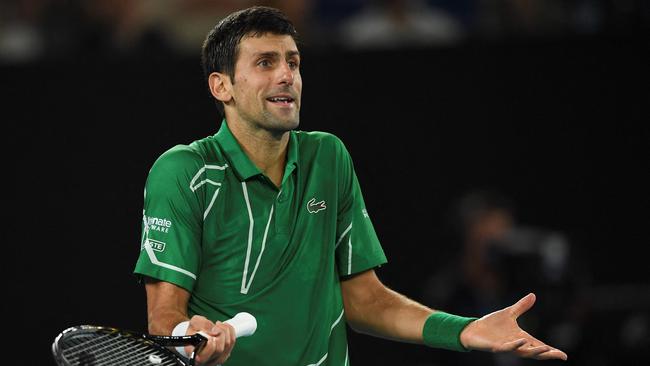
After all, the government makes the rules, so should have a definite advantage when it comes to enforcing them.
Yet matters seemed to shift over the weekend.
The federal Government, through the office of Home Affairs Minister Karen Andrews, applied for an additional two days to prepare their case against Djokovic.
That application was rejected, but legal observers took meaning from the fact it had been sought in the first place. Significantly, the application following a filing of legal documents by Djokovic’s legal team. Whatever was in those documents obviously provided concern for the government.
This was a legal version of serve and volley, except the government sought to delay their return.
Leading lawyer Justin Quill, who happens also to be a gifted sports analyst, noted that the federal Government was “obviously scrambling” and on the “back foot”.
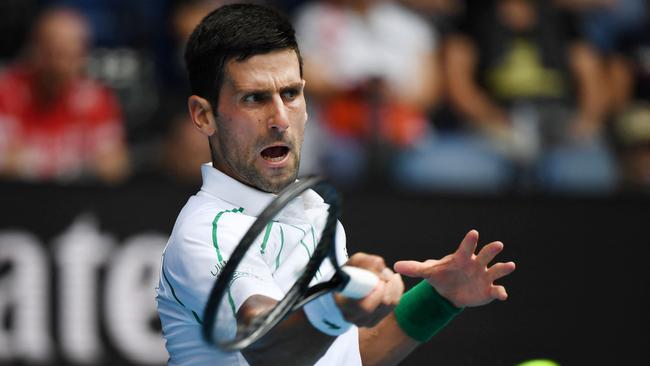
“It appears they now think there is a lot more to this than they had previously thought,” he said. At this point we can probably consider both sides to be just about level. Any advantage previously held by the government may have shifted.
Of course, an equally tense contest is being fought in the court of public opinion.
Many may have already reached a verdict, but there is much still to play for.
Depending on how the court case proceeds, there could then be further expressions of public opinion – this time at Melbourne’s Rod Laver Arena rather than a courtroom.
In that circumstance, there would also be the entertaining distraction of actual tennis.
The Daily Telegraph, printed and published by the proprietor, Nationwide News Pty Ltd A.C.N. 008438828 of 2 Holt St, Surry Hills NSW 2010, at 26-52 Hume Highway, Chullora. Responsibility for election comment is taken by the Editor, Ben English.




